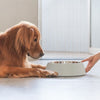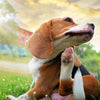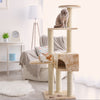5 Puppy Training Essentials
- by Rufus and Coco
Training is essential for dogs, and while some breeds might be easier to train than others, the truth is that teaching your pet to behave as early as possible can prevent bad behaviours from developing throughout their life.
But training calls for a lot of commitment on the part of pet parents. It calls for structure, routine, and quite a bit of time spent on trying to teach your dog new commands -- and in order for your mate not to forget them, you have to practice them regularly.
If you want to try to train your puppy without the help of a professional dog trainer, here’s a list of items you need for that purpose!
5 Things You Need for Puppy Training
Before we move on to the actual selection of items you’ll require for training your dog, we’d like to note that the perfect training schedule involves consistency.
Instead of going to the park once a week and trying to teach your pet to learn commands only then, we recommend creating a routine where you practice commands for 10 to 20 minutes every day.
Short and frequent training sessions are far better than long ones simply because most dogs tend to lose patience or their ability to focus on one thing, especially when performing repetitive tasks. So, daily training your dog for 10 minutes in the morning and 10 minutes in the evening is the best way of going about things.
Rewards and a reward pouch
Your dog’s favourite treats are absolutely essential when it comes to training as they can ensure that your dog is motivated enough to get the commands right. As picky eaters as some pets might be, they are still likely to love one type of snack.
What we’d like to suggest is for you to use bite-sized treats instead of larger ones. Your dog should also not have had a large meal before, as that might make them less prone to wanting to get the reward.

Getting a reward pouch might be a good idea if you want to practice the commands while you’re in the park and will need a zippered bag to keep the snacks in.
Clickers
Reinforcing positive behaviour in dogs by using clickers works great. In fact, these days, some clickers can even be found on dog leashes. This type of small gadget can go a long way when it comes to educating your dog as you can pretty much use it throughout the day.
Do keep in mind that the clicker sound has to be associated with a broad command such as ‘sit’ or ‘behave’ where your dog stops the activity they’re currently engaged in. This can come in handy for times where your dog might even be in danger.
Leash and harness
Puppies have to be trained with a leash and harness because a typical collar might be too hard on their throats. Besides, a front-clip harness can help deter pulling and also make it more convenient for you to guide your pooch.
The lead has to be strong, high-quality, and long enough so that you have enough control over your pup, yet at the same time, they shouldn't have too much freedom to get in trouble.
Toys
All dogs love treats, but some of them can prefer playing rather than eating all throughout the day. For this reason, a play ball or a toy that can be filled with your dog’s favourite pate or canned food can be a quite motivating type of reward.
Best of all, a toy allows you to continue your training outdoors - you can practice your commands for 5 minutes, then play catch with a stick or a ball, and then complete another training session.
By the end of it all, your puppy will be thoroughly fatigued, so you can also expect to enjoy a peaceful evening in their company.
A portable mat
Some dogs learn a couple of commands on a mat, such as sitting, staying, or anything else. If that happens, you can transport the mat to any other place to practice your training routine.
But the point is that the mat you get in the first place has to be affordable and lightweight enough for you to carry it easily and conveniently. Your dog has to feel comfortable with it since they’re going to stand and sit on it time and again.
Honourable mentions
Novel food rewards
Some dogs respond well to you changing their treats every once in a while. Everyone gets bored, and puppies are no exception, even though they might love food more than their adult counterparts.
Switch between the dog snacks that you use for training but stick to those that you know your dog loves. If your pooch seems to be a human food aficionado, you can give them a bit as a reward, but try to choose something perfectly safe such as baby food (chicken and gravy puree, for example).
Barriers
Not everyone loves keeping their dog in a crate, but the truth is that you have to establish some boundaries in order for your dog to behave in your home.
Barriers, pet gates, or playpens can be quite helpful if you have to contain your dog for managing their chewing behaviour or for house training.
Dog training book
No one was born an expert in dog training, and if you really don’t have the means to hire a professional trainer, one way of learning some of the basic techniques would be to do more reading about them.
The book should ideally come with easy-to-follow instructions and should be written by someone with extensive experience in training dogs.
- Posted in:
- behaviour
- dog
- how to help
- tips








